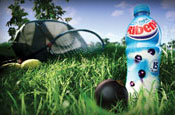Made by Carters, the drink was distributed free and unbranded to the nation's children. It is ironic, then, that some parents are now worried about Ribena's effect on children's health and shifting their loyalty to juices and smoothies.
Ribena has attempted to innovate by adding a Raspberry & Pomegranate variant to its Really Light range and launching a 100% Pure Juices line. But sales fell in the year to April by 10% despite this product development.
One previous attempt to appear more healthy incurred the wrath of the Advertising Standards Authority (ASA), which deemed Ribena Tooth Kind ads misleading despite having accreditation from the British Dental Association. Arguably, the negative publicity around the ASA decision contributed to a loss of consumer trust.
While Ribena might take heart from the news that consumers are beginning to swap smoothies for cheaper alternatives - as indicated by a slip in sales at Innocent - the change in shopping habits is likely to last only as long as the current economic downturn.
So, how can Ribena reinvigorate itself? We asked Andrew Marsden, a brand consultant and former marketing director of Britvic, and Alison Hoad, deputy chairman and head of planning at RKCR/Y&R, which handles the Danone Waters business.
Andrew Marsden brand consultant, Andrew Marsden Consulting
First of all, it's unfortunate, and, frankly, astonishing, given that Ribena is owned by SmithKlineBeecham, that such a well-established brand should find itself in this situation. It also had to endure the PR nightmare of accusations that it misled parents in New Zealand over its principal vitamin C claim.
I suspect this boils down to poor quality control. Vitamin C degrades over time when in acid, and that should have been factored in to the product's shelf-life declaration.
This follows on from the old problem of mums trusting Ribena enough to put it into dummies - to the dental detriment of their children.
These are basic mistakes that have undermined the core propositions of the brand and its credibility, and destroyed consumer trust. Ribena is unusual as a soft-drinks brand in that it makes scientific health claims. Maintaining
the credibility of those claims is therefore paramount.
I can only think that SmithKline-Beecham has taken its eye off the ball with Ribena, and it should remember that while consumers can take brands for granted, it never works the other way round.
Remedy
- Pause for breath and then go back to basics. Consider the role of the brand and clearly establish what it stands for, nutritional or not.
- Review quality control.
- Decide whether it should ever come out of the ‘dark berry' market, where the fruit are known for their indulgent flavour and beneficial anti-oxidants, and rationalise the range accordingly.
- Become an expert based on the decisions made on the above and restore trust among consumers.
Alison Hoad deputy chairman and head of planning, RKCR/Y&R
I grew up on Ribena and it's a staple with my kids, but elsewhere in Britain this tradition isn't being passed on. We're more health-conscious now and
juices and smoothies are seen as a healthier choice.
Robinsons cleverly didn't claim its cordials were healthy, but highlighted how easy it is to drink water when mixed with the drinks. In contrast, Ribena has pushed its health credentials with the British Dental Association's accreditation of its Tooth Kind claims and the launch of 100% Juices.
Its provenance-based advertising talks solely about its blackcurrants - ‘95% of British blackcurrants make it'. But it's playing a game it cannot win. A cordial cannot beat a juice or smoothie on health grounds, especially when it has been vilified by dentists for many years.
Speaking as a mum, I know Ribena has a relevant role, but, like its packaging, it needs to be dusted off and updated. Ribena is served in our house as a treat or a diversionary tactic. Put simply, I view it as less damaging than biscuits, crisps or chocolate, and more exciting than a piece of fruit.
Remedy
- Focus on re-engaging mums. Don't dilute marketing by targeting kids, teens and mothers.
- Be clear that Ribena's role is as a treat. Not as sinful as the holy trinity of ice cream, chocolate and Coca-Cola - use this as a virtue. Small treats tend to be given more frequently.
- Use the blackcurrant heritage to maximise treat appeal, ranging from fun associations of smallness or the colour purple to the taste of the fruit, to building on the emerging truth that the darker the colour of the fruit, the healthier it is.


